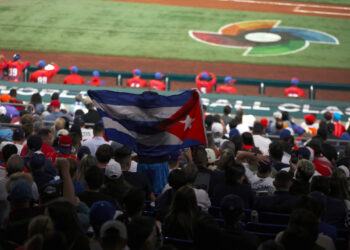Sometimes, but only sometimes … and almost always at night, from the Piano Bar, the Modibar or the nightclub of the Guantanamo Hotel in the city of the same name, a rhythm stranger to high pitched regguetón and techno music, rap and other contemporary styles, floods the wide, straight streets of Cuba’s easternmost city.
It’s a sound that, although unusual for this time of short-lived songs, it is not strange to most of Guantanamo people who are 35 or older. It is the Soul, songs from the “soul”, and expression, as critic Peter Guralnick put it “Soul is the expression of a black solidarity, of the pride of a nation who wanted to end up with these centuries of segregation and who had found in these chants the practical means to claim its identity and spirituality.”
Those that in the province promote this sound that emerged between the 50 and 60 of the last century called themselves "Marvin Gaye".Soul Club. Its membership is of over 200 members and they insist they are “the first Soul Club that existed in Cuba.” To prove this they explain that it was created on July 18, 1992.
José Ángel Stuol Betancourt is one of his sixty original members and that’s why, with the right his years give him and his devotion to the music that represented the claims of poor and black people of America, he says the idea for the group came to him when he watched the U.S. program "Soul Train", broadcast by one of the TV stations whose signal reached Guantanamo in the days when Sidney Poitier and Harry Belafonte popularized this music with their hairstyles and clothes while Stevie Wonder, Aretha Franklin and Patti Labelle, became, thanks to their extraordinary voices, the stars of the rhythm.
Then in the ’80s, soul became "retro soul" and "quiet storm". Then it became "urban". Michael and Janet Jackson, Whitney Houston and Babyface, stood as its new figures.
Time passed and they stopped broadcasting Soul Train … Even the gatherings at the Club that at the home of the brothers Guillermo and Gustavo Argeis were almost on daily basis, their frequency decreased to once or twice a month in the early ’90s.
When I saw them for the first time together, they were in the headquarters of the Hermanos Saiz Association of the city of Guantanamo. That was five years ago and even then, with 15 years of passion, its members danced and hummed the "I Got a Woman" by Ray Charles and Aretha Franklin songs, James Brown, Barry White and Diana Ross, as if their lives were at stake.
At that time they told me that this was their time "to dance, to be comfortable in a place where people know the meaning of the Soul and loved it". They also talked about the founding days of the Club, in 1984, when they came up with the idea of creating a group for fans of the genre, and even though of several names for it: Barry White, James Brown, Tina Turner.
In the end they decided on Marvin Gaye. The author of What’s Going On, Midnight Love, and Sexual Healing, had been killed by his father, in the midst of a house discussion, on April 1, 1984. One shot killed him in the same room where months earlier, hallucinating from drugs, he had attempted suicide.
Currently the "Marvin Gaye" Club of Soul is in its heyday: it has hundreds of members and has expanded its meeting facilities and enjoy the Piano Bar, the Modibar and Guantanamo hotel disco. Sometimes in these places, those youngsters, elders today, gather, to relive the past, to travel to that time where not only sexual liberalism and soul music flourished, but also great leaders emerged as pacifist Martin Luther King.










